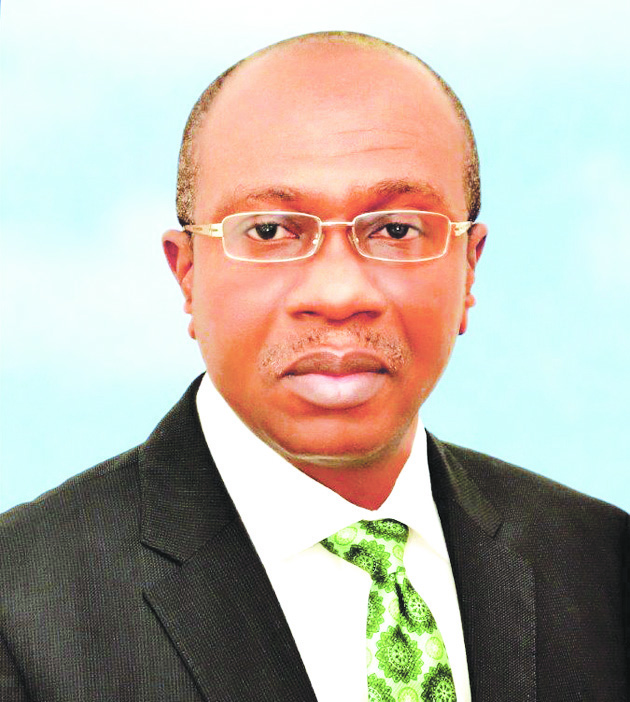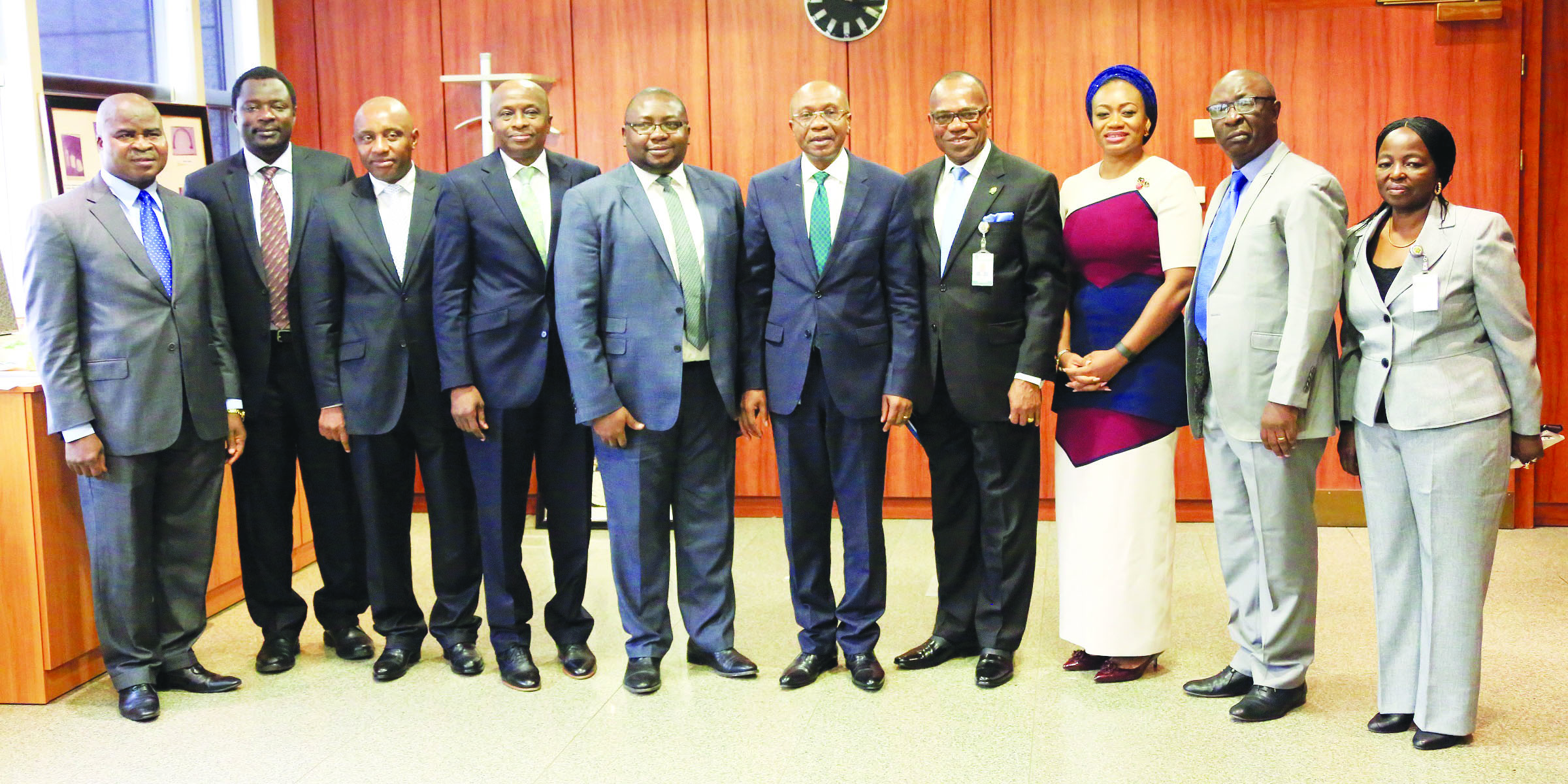By Joni Akpederi
The re-constituting of the Monetary Policy Committee (pictured above) of the Central Bank of Nigeria in April, 2018 is regarded by some as a sign of the bank’s victory in the battle to save the foreign exchange market from total collapse. For the populace, the restoration of confidence and stability in the FX market, means more. Coming a short while after the country’s emergence from recession, businesses and ordinary folks alike can’t wait to feel again the throbbing pulse of an economy global pundits predict would be a world-beater in the medium-to-long-term, on account of its impressive endowment in human and material resources.
Latest figures from the Central Bank of Nigeria (CBN) show that Nigeria’s stash of foreign exchange crossed the $47 trillion mark in April this year to score a five-year high.
The sum even surpassed the Bank’s $40billion target and the most optimistic projections of sundry commentators who have made fretting over the state of Nigeria’s economy a pastime. At its lowest, in 2016, the reserves had plunged to about $23 billion. The drop had so enervated the Central Bank, that it could not stop the naira exchange rate’s crash to an all-time low of N520 to the US dollar at the parallel market nor could it prevent the wholesale exit of corporate entities from the economy.
CBN Governor Godwin Emefiele is so upbeat about the latest development that he predicts that the reserves may hit $50 billion by year-end if conditions remain favourable in the oil market. Already, monthly import bill has dropped propitiously from an average of $5.5 billion to $1.9 billion as at June last year while oil prices have crossed the $70 bar.
For a country that has been battling a barrage of brickbats over the management of its foreign exchange market, the news of rising external reserves came as a welcome respite. It means that citizens can rest assured that the apex bank, which says it is committed to defending the value of the naira, the local currency, will have enough ammunition to continue doing so in the near-to-mid term. It also means that, the nation, which unfortunately, still relies on importation of basic needs, has enough cash to pay for more than 20 months of imports. Impressed by the development, economy watchers worldwide are giving kudos to the country’s economy managers, not least, the Central Bank.
The International Monetary Fund (IMF) is one such newfound believer in the Bank’s strategy. The Fund’s about-face from its earlier antagonistic position to CBN’s policy must surprise even its own experts. In its Article IV Consultation report of March 2018, the Fund said: The “Rising oil prices, new foreign exchange measures, attractive yields on government securities and a tighter monetary policy have contributed to better foreign exchange availability, increased reserves to a four-year high, and contained inflationary pressure”.
Meaning: The CBN, under Governor Godwin Emefiele had been right all along to ignore pressure from all manner of foreign experts and local detractors. The cocktail of policy measures the Bank launched and stuck by (see pullout) in response to the volatility in the foreign exchange market and the financial system in general, have proved to be the medicine the economy needed to return to stability.

The Bank also got commendation at home. Last December, a vocal non-governmental organization in the country, the Coalition of Civil Societies and Media Executives for Good Governance in Nigeria (COMEGG) gave hard-working Emefiele the self-explanatory award of the “Most Distinguished CBN Governor of the Decade”. The group’s President Kenneth Aigbegbele, said they were particularly impressed that “the economy has rebounded in the shortest possible time” owing to the “repositioning of the apex bank in terms of ICT, monetary policy directions and financial tools which greatly assisted the country’s economy and stability in the global market.”
The CBN has been able to achieve what many analysts thought impossible by freeing itself from the shackles of dictation from foreign “experts” and relying on its knowledge of its peculiar environment. It could not have been otherwise: the Bank’s chief fairly believes that “a well-functioning financial system is a sine qua non for economic growth and development.” Which institution but the CBN can deliver this vital economic service?
Third consecutive quarterly growth
Effusive and bubbling with confidence in the new direction Nigeria is headed, Governor Emefiele says “the worst is over” for the economy. His triumphant word is reinforced by the gradual return to macroeconomic stability reflected in the third consecutive quarterly growth in real GDP in the fourth quarter of 2017, signaling a complete turnaround from recession. The Bank chief is also emboldened by the continued moderation in all macroeconomic indices including easing inflation (now sub-15 percent) and downward trending foreign exchange rates from the scary numbers recorded at the turn of 2016.
Bank statistics show that the service sector’s return to growth is the most obvious indicator of the local currency of the strengthening economy even though other sectors are also showing signs of picking up. In sum, the economy as a whole, according to the Bank authorities, is expected to post a “fragile” growth of just under 2 percent this year.
Fragile growth?
While the markets may be pleased about Nigeria’s recovery and growth projections, the CBN cautions that much needs to be done to keep the economy on the growth track. It notes several risk factors, including the potential impact of 2019 election-related spending, which is just around the corner; herdsmen-related violence in the northern part of the country, which continues to cause social disorder as well as disruptions in agricultural productivity and yield. All these are more worrying when considered in the context of the tax authorities’ still-weak efforts at generating the volume of revenue needed to counter the losses being recorded due to the activities of insurgents around the country.
On the international front, the economy is also facing the challenges posed by the recovering economies in the developed world, where higher interest rates and yields have the potential of pulling away investor interest in Nigeria’s currently attractive markets.
Synching with the fiscal sector
Fully cognizant of the need to work in collaboration with the fiscal authorities, the CBN has continued to encourage government to reduce its debt profile, especially at the domestic end. This, it says, will help the banking sector — which currently is saddled with huge non-performing loans, while improving liquidity and funds available to domestic businesses. On its part, the Bank has tightened its surveillance of all banks by introducing extra measures to enhance compliance with prudential regulations. For instance, deposit-money banks are now under obligation to rein in their penchant for paying out dividends to shareholders when operating profits clearly show that they should refrain from doing so. The directive will ensure that banks channel more funds into repairing their balance sheets and making adequate provisions for risk, especially doubtful and bad debts.
To help the banks perform their financial intermediary role better, the CBN is empowering development banks such as the Bank of Industry (BoI), aside from its work with commercial banks. The institution’s special funds such as the 235 billion naira Intervention Fund for Manufacturing Refinancing and Restructuring Facilities of Bank’s Loans and the 300 billion naira Power and Airline Intervention Fund will enable it to extend credit to strategic job-creating sectors of the economy at single-digit rates.
The CBN also has other special intervention funds which domestic and small businesses clients can access at rates more favourable than prevailing rates in the economy, which currently take their cue from the MPC rate of 14 percent (see pullout). They are the CBN’s response to the cries of MSMEs, who say they cannot cope with the huge interest rates obtainable at the open money market.
Most important, the CBN has openly but subtly called on the fiscal authorities to “freeze” the growth in the allocations made to all constituent sub-national bodies, to enable the country save enough resources against “future oil shocks”. It is the Bank’s way of cautioning Nigeria’s economy managers to avoid making the mistake that sent the country into the harrowing recession it is only just climbing out of.


